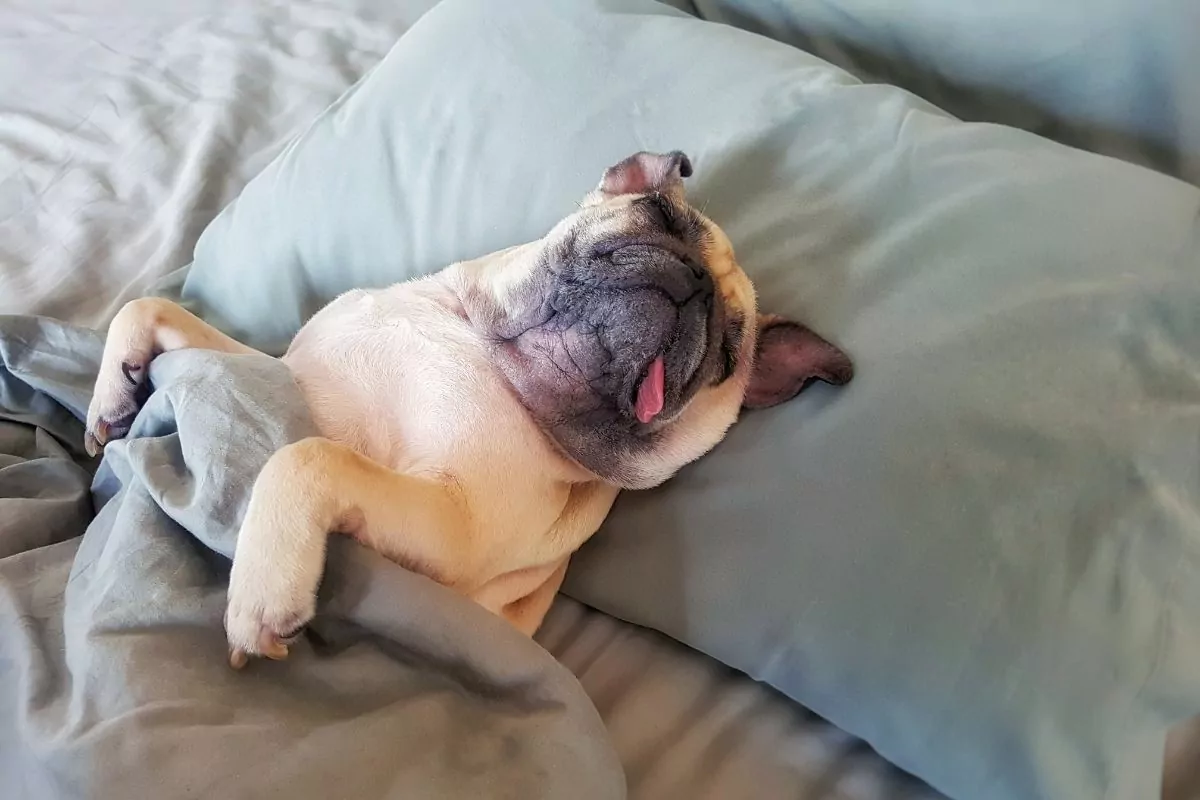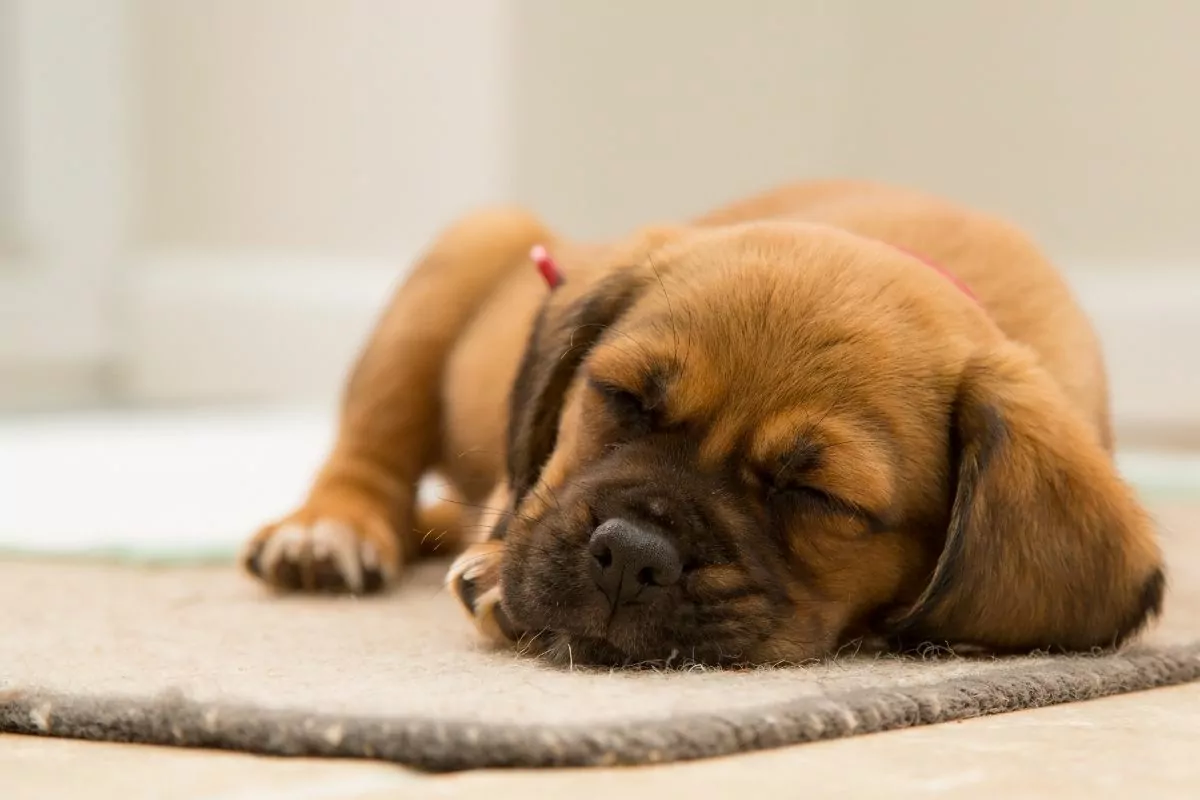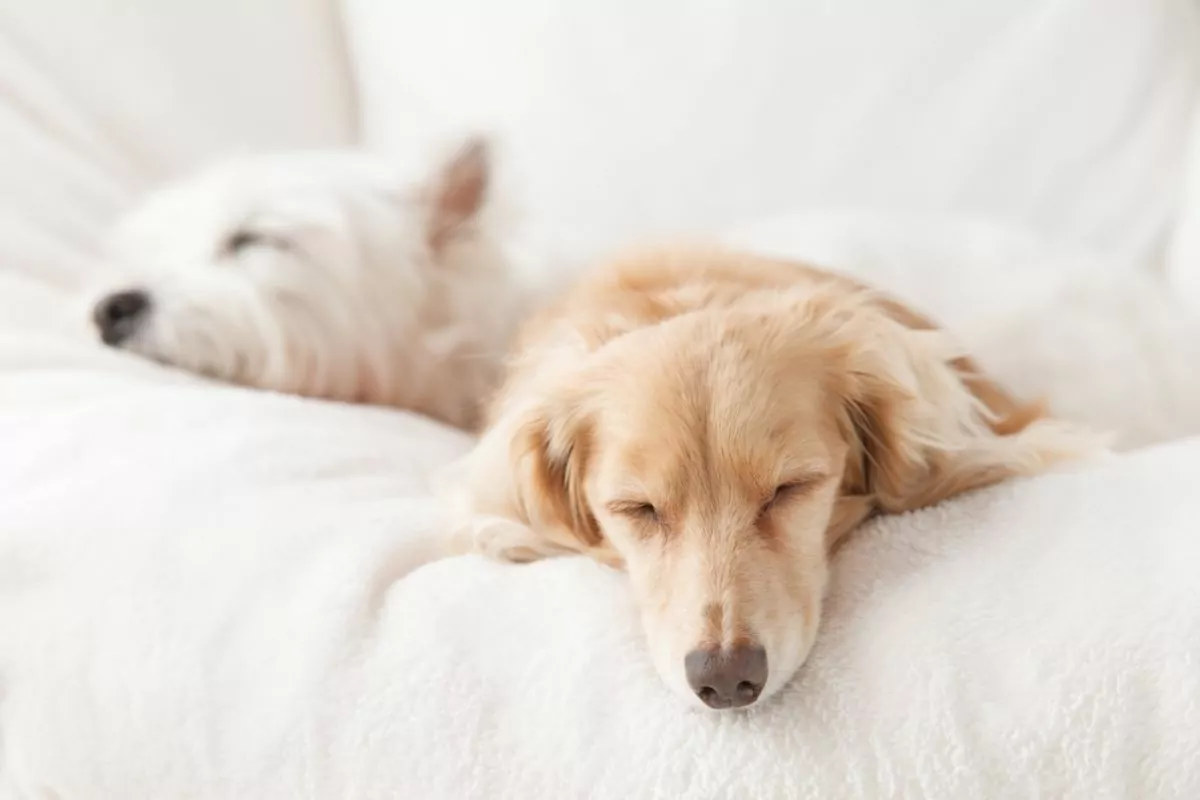The Importance of Sleeping for Dogs
If you own a dog, you probably catch them sleeping often, but how much sleep do dogs need? Unfortunately, the answer varies by age and breed and can be negatively affected by health conditions and stress, just like people.
In this article, we will delve into sleep for our canine companions and what to do if your dog’s sleep schedule needs some improvement.

How Much Sleep Do Dogs Need?
You may think your dog sleeps all day, but this is likely because you spot them in between activities having a rest. This is normal for dogs as they usually spend half of the day sleeping or 12 hours per day. On top of this extensive sleep schedule they keep, dogs also spend around a third of their awake hours lying down.
While all this time spent horizontal may seem excessive, it’s part of the reason they make such good pets, but when it’s time for action, they are ready!
Throughout different life stages, the amount of sleep a dog needs will vary.
Puppies
If you’re familiar with human babies, you might know how much they sleep. This will have you questioning, do puppies sleep a lot?
While puppies are full-on, you may also notice your puppy sleeping a lot. This is normal and necessary for the health and development of your pup. On average, a young puppy will sleep about 18 to 20 hours per day; this is made of a combination of power naps and deep periods of sleep.
The amount your puppy sleeps will slowly reduce as they age, and by adulthood, they will be sleeping far less than this.
Adulthood
As they get older, you will notice your dog sleeping less than when they were a puppy. Adult dogs will typically sleep for between 8-13 hours or about half of the day.
Large breed adult dogs will often sleep more than smaller breeds, while working dogs usually sleep less than companion dogs.
Often, by the time you arrive home from work, your dog’s sleeping has finished for the day, and they are ready for action!
Senior Dogs
Once a dog approaches their sunset years, you may notice them resting more; often, this will take up to 16 to 18 hours each day. Of course, senior dogs may not sleep for this whole period, but much like older humans, the energy required to move around needs more rest as a dog ages.
Why Do Dogs Sleep so Much?
Why do dogs sleep so much? While it is true that dogs sleep a lot more than people do, the deep sleep that we experience at night time only makes up a small portion of their day.
The deepest type of sleep is called Rapid Eye Movement or REM phase. REM sleep is crucial to brain health and helps prevent anxiety and irritability in humans. However, REM sleep only makes up about 10 percent of a dog’s sleep, compared with humans, where REM sleep makes up 25 percent.
This might explain why dogs sleep so much, as they need more time asleep to reach their required REM sleep allotment.
On top of needing more sleep, dogs that sleep a lot may also be doing it out of boredom. For example, companion dogs are known to sleep more than working dogs, likely due to spending a lot of time alone or around the house. While this may not be ideal, it is what makes dogs such great pets; they don’t mind being lazy while we are busy.
What can Affect the Number of Hours a Dog Sleeps?
As previously discussed, dogs’ sleeping will change as they age, but how many dogs hours of sleep your pooch gets can also be affected by health issues.
Stress and anxiety can cause poor sleeping in a dog. For example, thunderstorms, fireworks, or changes in routine can make sleep worse or prevent a dog from falling asleep. On top of this, not sleeping enough can cause a dog’s anxiety to go up, which can cause a vicious cycle.
Animals with high energy that don’t get enough exercise may struggle to rest as they are still looking to play.
Health conditions such as kidney disease, flea infestation, or diarrhea can keep a dog up from regular toileting or scratching. Getting the problem sorted will help your dog rest more easily.
What are Normal Sleeping Patterns and What are Not?
If your dog has a poor routine, you might start wondering, are dogs nocturnal? Dogs have a crepuscular sleeping pattern, meaning they are most active in the morning and evening and rest during the day. This is retained from wild dogs who hunt at twilight hours.
If a dog is kept active throughout the day, this pattern may change, and the dog will sleep more at night to make up for the lack of daytime sleeping.
It is normal for dogs to sleep in short bursts rather than long stretches. However, it is not normal for dogs to stay up all night or sleep all day, especially if they are not rousable.

What to do When You Notice Abnormal Canine Sleeping Habits
The first step in assessing your dog’s sleeping habits is to confirm they are abnormal; what might seem odd for you could be normal to them. For example, a seven-month-old puppy will have different sleeping habits than a 17-year-old dog, which may be appropriate for their stage.
If you are unsure if their sleeping habits are abnormal, contact your veterinarian; they can help you figure this out.
Once you know sleeping habits are abnormal in your dog, the next step is to assess if any changes have happened in the environment such, as new people, new pets, a new routine, or even a new house. It can take time for dogs to adjust to changes at home, affecting their sleep.
If there are no changes in the environment, the next step is to consider if there could be anything medically wrong such as anxiety or health conditions. For this, it is best to book in to see a veterinarian and have your animal checked over. Diagnostic tests or medication may be required to help your dog sleep better.
How to Improve Require Hours of Dog Sleeping?
The first step to improving sleep for your dog is to make sure their sleeping environment is appropriate. Check the temperature, light, and noise in their sleeping space and adjust as necessary to make it more comfortable.
If a dog is struggling to sleep alone, you may need to move them into your room to let them settle, then slowly move them out over a few days to adjust to their usual spot.
Dogs require physical and mental stimulation to help with a good night’s sleep. Regular exercise and training will ensure they are tired at the end of the day. Keeping a good routine will help your dog sleep more; regular exercise and rest can set your dog up for successful snoozing.
How to Develop a Doggie Sleeping Schedule
Just like babies, puppies benefit from being put onto a sleep schedule to make sure everyone in the house is getting enough sleep. However, while dogs are young, they will not sleep for long periods as they often need to relieve themselves.
The general rule for how long a puppy can sleep before they need a toilet trip is one hour per month plus one. So, for example, a five-month-old puppy will be able to sleep for six hours before needing a trip outside. Keeping this schedule of letting them out regularly will help them sleep better and lessen the risk of accidents in the house.
An adult dog can often sleep for ten to twelve hours without a toilet break but recently rescued adult dogs may need time to work up to long stretches if they aren’t used to your routine.
Setting up a good routine while puppies are young for feeding, toileting, playtime, and nap time is important. Once a pup has a strong foundation, the schedule can be loosened or adjusted to what suits your family.
What About Sleeping Aids for Dogs?
Dogs that aren’t sleeping can be stressful for the whole family, including the dog. This might make you want to reach for medicine to help. Once you have ensured that the sleeping environment is appropriate and your dog is healthy, your veterinarian may suggest medications to help.
Dogs with anxiety may benefit from pheromone products that aid in calming them down or anti-anxiety medicines that your veterinarian can prescribe.
Ensure to reach out to your veterinarian before giving your dog anything to help it sleep. While word of mouth or the internet may suggest products to help, they may not be suitable for your pet.

The Final Bark, or is it Snore?
Sleep is crucial to the health of our dogs, and as you will now know, they need a lot of it.
While it is true that dogs sleep more than us, deep restorative REM sleep makes up a smaller proportion of their sleep which might be a clue as to why they need so much.
Ensuring your dog is healthy and their sleeping environment is suitable will go a long way to helping your dog sleep well. Health issues and anxiety can make sleeping more difficult for dogs and often requires a veterinarian’s help to resolve these problems.
While your puppy is young, you can get them into a sleeping schedule that will help immensely throughout their lives, but make sure to make allowances for their tiny bodies and take them out regularly to go potty.
